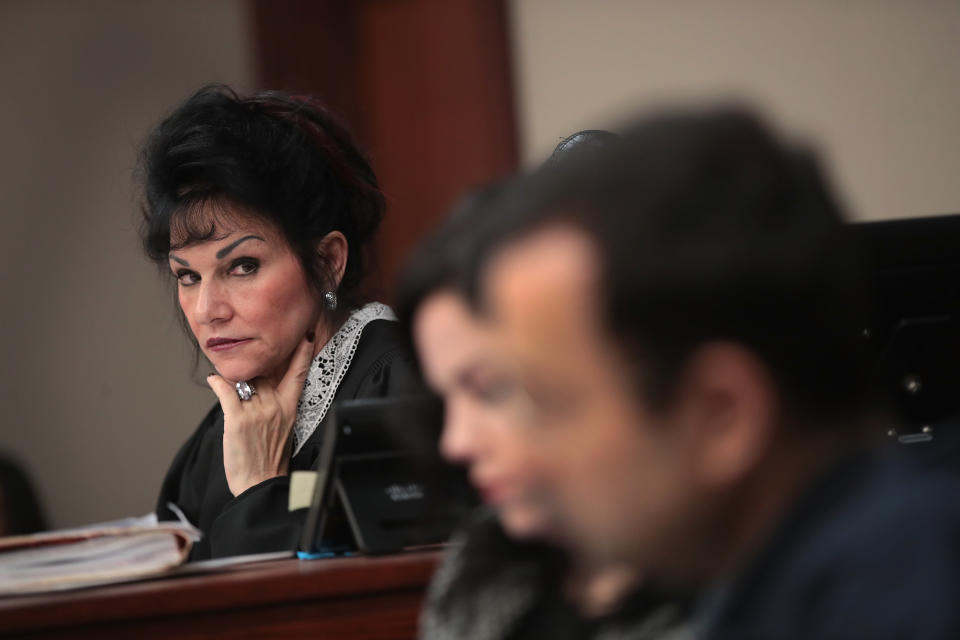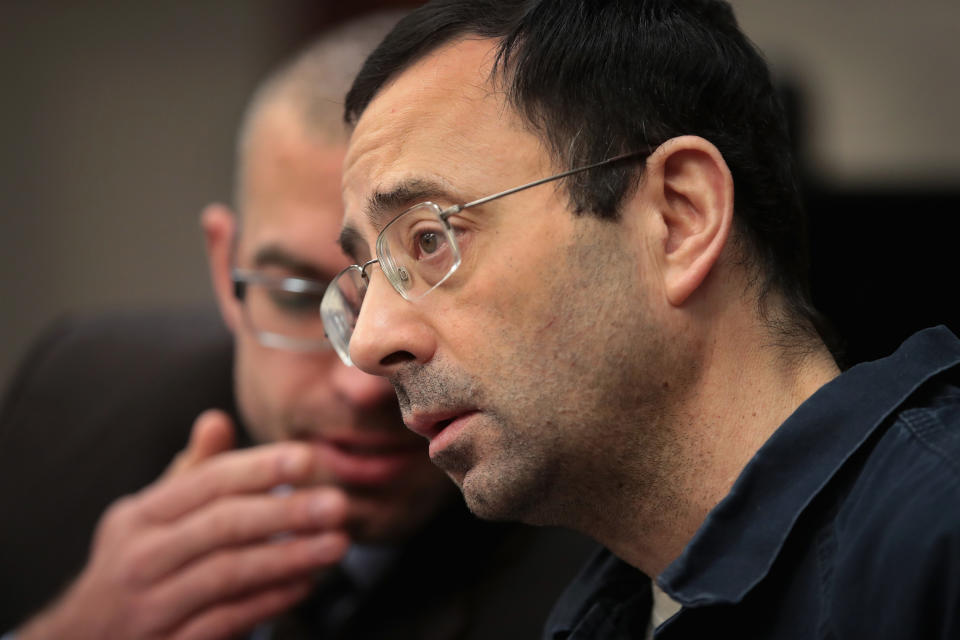People are calling the judge who sent Larry Nassar to prison a hero
Along with the more than 100 women who read emotional victim impact statements at the sexual assault trial of former doctor Larry Nassar is an unsung hero: Judge Rosemarie Aquilina, equal parts magistrate, advocate, and surrogate mom.
“Your decision to assault was precise, calculated, manipulative, devious, despicable,” the judge told Nassar, 54, on Wednesday as she sentenced him to 40 to 175 years in prison, in a hearing that was called heroic and “Tony-worthy” on social media. “It was my honor and privilege to sentence you, because, sir, you do not deserve to ever walk outside a prison ever again. I’ve just signed your death warrant.”
To Judge Aquilina : THANK YOU, YOU ARE MY HERO
&
Shout out to all of the survivors for being so brave & speaking like the queens that you are while looking at that monster. He will no longer have the power to steal our happiness or joy. I stand with every one of you pic.twitter.com/b5SMmjZgeW
— Simone Biles (@Simone_Biles) January 24, 2018
How do I get Judge Aquilina to be my bestie? https://t.co/YVmGskB7YG
— Whitney Cummings (@WhitneyCummings) January 24, 2018
Judge Aquilina is the real MVP#Nassar
— Princess Rahi (@Rahi_S08) January 24, 2018
Judge Rosemarie Aquilina is the baddest woman alive. Bomb after bomb after bomb laid on Nassar.
— Josh McBelichick (@my20throwndown) January 24, 2018
The judge in the Larry Nassar trial talking about her own status as a naturalized American and veteran, and speaking out for child victims of abuse right now is so powerful.
— Joy Reid (@JoyAnnReid) January 24, 2018
Take Larry Nassar's letter and throw it in the cell with him. Judge Aquilina, you are my hero. pic.twitter.com/nvAPEjQd9V
— Lindsi Bolton (@LBolt13) January 24, 2018
Maybe the one thing the left and the right can agree on: the badassery of Judge Rosemarie Aquilina.
— Bari Weiss (@bariweiss) January 24, 2018
This judge for president #NassarSentencing
— Taffy Akner (@taffyakner) January 24, 2018
“You have played on everyone’s vulnerability,” Aquilina said. “But I am not vulnerable. Not to you… I want you to know that as much as it was my honor and privilege to hear these sister survivors, it’s my honor and privilege to sentence you. Because, sir, you don’t deserve to walk outside of a prison again. You have done nothing to control your urges, and everywhere you walk, destruction will occur to those most vulnerable.”
Over the past week, the 59-year-old mother of five and grandmother of two has patiently allowed Nassar’s victims and their loved ones to share their experiences under his abuse in live-streamed sessions.
But Aquilina doesn’t just listen — she offers pearls of wisdom and encouragement to the women and unleashes scathing remarks to Nassar, who spent the entirety of his seven-day hearing squirming in discomfort and hanging his head.

“I wish my robe came with a magic wand so I can wave it over you and heal you,” Aquilina said to victim Taylor Cole, who revealed she suffers from insomnia as a result of the abuse. “But that’s fairy tales.”
When Nicole Reeb shared thoughts of suicide, the judge said, “Only the defendant would be better off if you were not here. Please stay with us. Stay with your family. Your children need you.”
Aquilina also told Bailey Lorencen, “The military has not yet come up with fiber as strong as you,” adding, “Mattel ought to make toys so that little girls can look at you and say, ‘I want to be her.’ Thank you so much for being here, and for your strength.”
And when Amanda Cormier, a music lover who told the court that she could no longer write songs after the abuse, the judge encouraged her, “It seems to me, after this, you can finish writing. You found your voice. It’s a strong, effective, brave voice, and you have a child coming. Maybe what you need to do is start and finish a lullaby.”
She said something similar to Olivia Cowan: “Your dreams are still out there. His are squashed.”
Rachael Denhollander was one of the first women to go public with allegations against Nassar through an investigation by The Indianapolis Star in September 2016 and was the last to speak. She called Nassar the most dangerous type of abuser, “one who is capable of manipulating his victims through coldly calculated grooming methodologies, presenting the most wholesome and caring external persona as a deliberate means to ensure a steady stream of young children to assault.”
Aquilina responded, saying, “You are the bravest person I have ever had in my courtroom.”
Although judges are theoretically supposed to be impartial, gender may play a role in decision-making. Research from Harvard and Emory universities found that female judges with daughters vote in a more “feminist fashion” on gender issues than those with only sons. But another small study found that male and female judges ultimately reach the same conclusions; they just follow different “gender-related” paths.

According to a profile published Wednesday in the New York Times, the judge spent two decades in the Michigan Army National Guard — where her nickname was “Barracuda Aquilina” — and writes crime novels in her spare time. Aquilina’s appearance is also noteworthy, although largely unimportant in the bigger picture: an impeccable manicure, bright pink lipstick to match the pink streak in her tousled updo, and arched eyebrows, the same look she models in her official headshot.
She once sent a copy of her ruling in a Detroit bankruptcy case to former President Obama. “My message to Obama was: ‘Get ready to cough up some federal money. This is coming,’” Aquilina told the Washtenaw County Legal News.
She was no less direct with Nassar. Last week, when the disgraced doctor penned a handwritten, single-spaced letter complaining, “I’m very concerned about my ability to face witnesses these next four days, mentally,” adding that the judge had allowed proceedings to turn into a “media circus,” Aquilina called his request “mumbo jumbo” before flinging his letter off her desk.
This GIF of Judge Aquilina throwing away the letter Larry Nassar wrote the court about how hard it is for him to listen to victim testimonies PRETTY MUCH SAYS IT ALL. pic.twitter.com/5HB9WMaPqU
— Ellie Hall (@ellievhall) January 24, 2018
“Now, this is entertaining to me,” she told Nassar. “I suspect you have watched too much television. It’s delusional. You need to talk about these issues with a therapist, and that’s not me.”
Aquilina finished by saying, “You may find it harsh that you are here listening, but nothing is as harsh as what your victims endured for thousands of hours at your hands. You spent thousands of hours perpetrating sexual misconduct on minors. Spending four or five days listening to them is significantly minor considering hours of pleasure at their expense and ruining their lives.”
On Wednesday, before delivering her sentencing, Aquilina read another of Nassar’s letters. “I was a good doctor because my treatments worked, and those patients that are now speaking out are the same ones that praised and came back over and over,” Nassar wrote. “The media convinced them that everything I did was wrong and bad. They feel I broke their trust. Hell hath no fury like a woman scorned,” a line that many gasped at in the courtroom when it was read by Aquilina aloud.
“Hell hath no fury like a woman scorned”: Audible gasps were heard in the courtroom as Judge Rosemarie Aquilina read a letter written by former USA Gymnastics doctor Larry Nassar during his sentencing https://t.co/VbFMSwbZum pic.twitter.com/ZlUKHyCBly
— CNN (@CNN) January 24, 2018
After finishing her dramatic and sarcastic reading, she asked Nassar, “Would you like to withdraw your plea?” He said, “No, your honor.”
“Because you’re guilty, aren’t you?” she replied. “I accept my plea,” he said.
“You have not yet owned what you did,” she added. “You still think somehow you are right, that you are a doctor, that you don’t have to listen, and that you did treatment? I wouldn’t send my dogs to you, sir.”
Here’s Judge Aquilina finishing the reading (literally and metaphorically) and doing a mic drop of the modern era. pic.twitter.com/w6VZJxrLY1
— shauna (@goldengateblond) January 24, 2018
She later added, “Justice requires more than what I can do on this bench.”
Before the courtroom burst into applause, the judge concluded the hearing by brushing off her media fame, insisting that she won’t be giving any interviews without a victim present. “This story is not about me,” she said. “It was never about me.”
Read Aquilina’s full message to the media:
Let me just say to the media, again, I’m just doing my job. I know you all want to talk to me. My secretary has informed me that I have a growing stack of requests from print media, from television, from magazines — from around the world, literally. This story is not about me. It never was about me. I hope I’ve opened some doors but, you see, I’m a little stupid because I thought everybody did what I did, and if they didn’t, maybe they ought to.
But I do this and have been doing it. And if you don’t believe me, the keeper of my words is right by my side. And lawyers who are hearing this are shaking their heads, saying, “Yup, I’ve waited too long, as she lets everybody talk.” Sometimes people get upset. I don’t care. I get paid the same. So I ask for the media who want to talk with me, I’m not going to be making any statements. I know that my office — and I may have even, I don’t know; it’s been a long couple of weeks — conveyed that after this is over . . .
It’s just not my story. After the appellate period runs, with victims by my side to tell their stories, I might answer some more questions than what I’ve said on the record. I don’t know what more I could possibly say. But I’m not going to talk with any media person until after the appeal period, and even then, if you talk to me about this case, I will have a survivor by my side because it is their story.
So I wanted everybody to hear that from me. I respect all of the media outlets. You have done just a fabulous job here. There hasn’t been any coalition more upset by this, and I do believe in the First Amendment, so I thank you all for being here because it’s an important story for the survivors.
As to today, I know there are a lot of survivors, family members, husbands, friends — a lot of people in the courtroom. You have voices. I’m going to leave the courtroom. Defendant will leave the courtroom. The attorneys may stay. The victims, family members, survivors, you may stay in the courtroom and talk with media. You can have your own press conference right here. Spur of the moment sometimes works out the best, doesn’t it?
Read more from, Yahoo Lifestyle:
Follow us on Instagram, Facebook, and Twitter for nonstop inspiration delivered fresh to your feed, every day.
